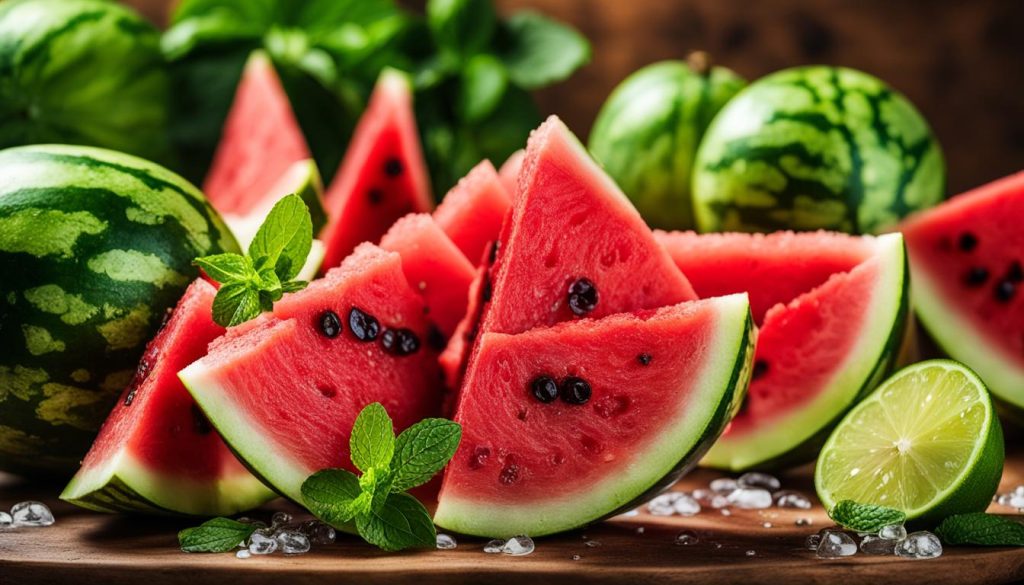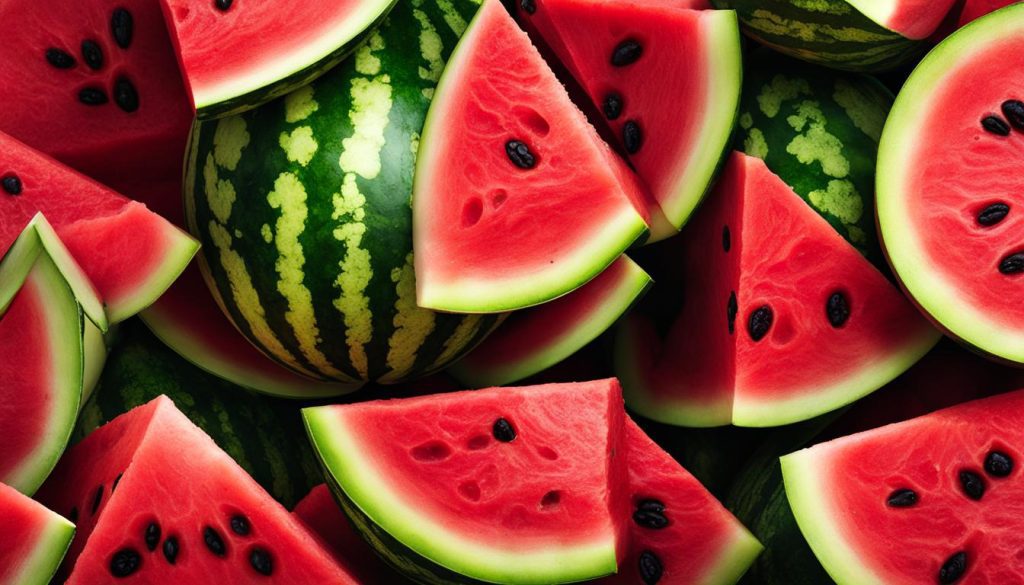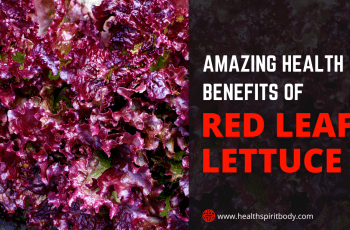When it comes to refreshing summer fruits, watermelon takes the crown. But did you know that this delicious treat also packs a powerful nutritional punch? From vitamins and minerals to antioxidants, watermelon is a superstar when it comes to promoting good health. So, grab a slice and discover the incredible watermelon health benefits!
Watermelon Health Benefits You’re Not Aware of
- Watermelon is low in calories and sugar, making it a healthy addition to your diet.
- With its high water content, watermelon helps keep you hydrated.
- Watermelon is rich in vitamins, minerals, and antioxidants that support various bodily functions.
- Regular consumption of watermelon may improve heart health, digestion, and skin health.
- Watermelon contains antioxidants that have potential anticancer and anti-inflammatory effects.
Watermelon Nutrition Facts
When it comes to nutrition, watermelon is a winner! According to the U.S. Department of Agriculture, one cup of watermelon contains only 45.6 calories, making it a guilt-free treat. But don’t let its low-calorie count fool you—watermelon is packed with essential nutrients that are beneficial for your overall health.
Watermelon is an excellent source of vitamins and minerals that support various bodily functions. It is rich in:
- Vitamin A: This vitamin is essential for good vision, a healthy immune system, and proper cellular growth and development.
- Vitamin C: Known for its antioxidant properties, vitamin C supports immune function, collagen production, and wound healing.
- Vitamin B6: This vitamin plays a crucial role in brain development, mood regulation, and the production of red blood cells and neurotransmitters.
- Potassium: An electrolyte that helps maintain proper heart and muscle function, potassium also helps regulate blood pressure.
- Lycopene: The vibrant red color of watermelon comes from lycopene, a powerful antioxidant that has been linked to a reduced risk of certain types of cancer and cardiovascular disease.
By including watermelon in your diet, you can give your body a refreshing boost of vitamins and minerals that contribute to overall well-being.
Hydration and Weight Loss
When it comes to staying hydrated, watermelon is a top contender. With its high water content of over 90%, this juicy fruit is an excellent choice to quench your thirst and maintain proper hydration. Hydration is vital for various bodily processes, including temperature regulation and nutrient delivery, so incorporating watermelon into your diet can help keep you refreshed and revitalized.
But that’s not all—watermelon also offers benefits for weight loss. Despite its sweet and refreshing taste, watermelon is surprisingly low in calories, making it a guilt-free snack option. Its high water content also adds to its satiating power, helping you feel full and satisfied without consuming excessive calories.
In fact, scientific studies have shown that including watermelon in your weight loss journey can lead to favorable outcomes. Research has indicated that regularly consuming watermelon can result in reduced body weight, body mass index (BMI), blood pressure, and waist circumference. With its hydrating properties and weight management potential, watermelon truly is a fruit worth incorporating into your diet.

So Why is Watermelon Beneficial for Weight Loss?
First and foremost, watermelon is low in calories. By choosing watermelon as a snack or adding it to your meals, you can satisfy your sweet tooth without compromising your weight loss goals. Additionally, the high water content in watermelon helps you feel full, reducing the temptation to overeat.
Watermelon also contains essential nutrients such as vitamins A and C, which support a healthy metabolism. These vitamins play a role in energy production and the breakdown of fats in the body, aiding in weight management. Moreover, the fiber content in watermelon contributes to satiety and promotes healthy digestion.
Incorporating watermelon into your weight loss journey can be as simple as enjoying a refreshing slice as a snack or adding it to your salads, smoothies, or desserts. With its hydrating properties, satisfying taste, and potential weight loss benefits, watermelon is a delicious and nutritious addition to any diet.
Heart Health Benefits
When it comes to promoting a healthy heart, watermelon is a fantastic choice. This juicy fruit is packed with nutrients that provide a range of benefits for heart health.
First and foremost, watermelon contains powerful antioxidants such as lycopene and vitamin C. These antioxidants help reduce inflammation and oxidative stress in the body, both of which are risk factors for heart disease. By incorporating watermelon into your diet, you can give your heart the protective support it needs to stay healthy and functioning optimally.
In addition, watermelon contains an amino acid called citrulline, which plays a crucial role in the production of nitric oxide. Nitric oxide helps relax and dilate blood vessels, leading to improved blood flow and lower blood pressure. By promoting healthy blood flow and reducing hypertension, watermelon can contribute to a healthier cardiovascular system.
Regular consumption of watermelon has been associated with a reduced risk of heart disease and stroke. By including this delicious fruit in your diet, you can enjoy its sweet taste while taking proactive steps towards better heart health.
Watermelon is a heart-healthy fruit that offers a variety of benefits for cardiovascular well-being. Its antioxidants, such as lycopene and vitamin C, help fight inflammation and oxidative stress, while the presence of citrulline supports the production of nitric oxide for improved blood flow. By incorporating watermelon into your diet, you can nourish your heart and reduce the risk of heart disease and stroke.
Digestive Health
When it comes to promoting healthy digestion, watermelon is a natural choice. This juicy fruit packs a double punch with its high water and fiber content, making it an excellent choice to support your digestive system.
The fiber in watermelon adds bulk to the stool, helping to promote regular bowel movements and prevent constipation. A regular intake of watermelon can help keep things moving smoothly and maintain overall digestive health.
Moreover, the high water content in watermelon aids in moving waste through the digestive system efficiently, ensuring that your body eliminates toxins effectively. Staying hydrated is essential for proper digestion, and watermelon’s natural hydration benefits can help support this process.
By incorporating watermelon into your diet, you are not only treating your taste buds, but also nourishing your digestive system. So, next time you’re looking for a refreshing snack, reach for a slice of watermelon to support your digestion and overall well-being.
Skin Health Benefits
When it comes to promoting healthy skin, watermelon is a true superstar. Packed with essential vitamins and antioxidants, this refreshing fruit can help enhance the appearance and overall health of your skin.
Vitamin C, found abundantly in watermelon, plays a key role in collagen production. Collagen is a protein that gives your skin its elasticity and firmness. By boosting collagen production, vitamin C helps improve skin elasticity and blood flow, resulting in a more youthful and radiant complexion.
Vitamin A is another skin-friendly nutrient present in watermelon. This vitamin aids in repairing skin cells and preventing dryness, keeping your skin supple and moisturized. Additionally, vitamin B6 found in watermelon supports acne prevention by regulating hormones that contribute to breakouts, helping to maintain clear and healthy skin.
Furthermore, watermelon contains lycopene, a powerful antioxidant that gives the fruit its vibrant red color. Lycopene has been found to have protective effects against sun damage by neutralizing harmful free radicals caused by exposure to UV rays. However, it’s important to note that while watermelon can provide some level of sun protection, it should never replace the use of sunscreen for adequate sun protection.
Incorporating watermelon into your diet can help nourish your skin from the inside out, giving you that healthy and glowing complexion you’ve always wanted.
Skin Health Benefits of Watermelon
- Vitamin C in watermelon boosts collagen production, improving skin elasticity and blood flow
- Vitamin A helps repair skin cells and prevents dryness for a supple and moisturized complexion
- Vitamin B6 supports acne prevention by regulating hormones that contribute to breakouts
- Lycopene in watermelon may provide some level of protection against sun damage
- Remember to still use sunscreen for adequate sun protection
Anticancer and Anti-inflammatory Effects
Watermelon is not only a refreshing and delicious fruit, but it also offers a range of health benefits. One of its notable properties is its high content of antioxidants, such as lycopene, which has potential anticancer effects. Consuming watermelon, with its abundant antioxidants, may help reduce the risk of certain types of cancer, including prostate and colorectal cancers.
The antioxidants and anti-inflammatory compounds found in watermelon play a vital role in reducing inflammation and oxidative stress within the body. Chronic inflammation and oxidative stress are known to contribute to the development of various diseases, so incorporating watermelon into your diet can be a proactive step in promoting overall health.

Aside from its refreshing taste, watermelon offers a range of nutritious properties that can support your well-being. Its antioxidants help combat potentially harmful free radicals in the body, while its anti-inflammatory compounds work to reduce inflammation and oxidative stress, which are linked to chronic diseases.
Adding watermelon to your diet can be a simple yet effective way to boost your overall health and well-being. Its delicious flavor, combined with its numerous health benefits, makes it a perfect addition to any meal or snack.
Conclusion
Watermelon is not only a delicious fruit but also a true nutritional powerhouse. Its high water content makes it a natural hydrator, while its abundance of vitamins, minerals, and antioxidants provide a wide range of health benefits. Incorporating watermelon into your diet can support heart health, aid in digestion, promote radiant skin, and even potentially help prevent certain types of cancer.
With its refreshing taste and numerous health benefits, watermelon is a perfect addition to any diet. Whether you enjoy it as a juicy snack, blend it into a refreshing smoothie, or use it in salads and desserts, you can indulge in the sweet goodness of watermelon while reaping its nutritional rewards. So why not embrace this summer staple and savor both its delectable taste and its multitude of health benefits?
Make the most of watermelon’s incredible properties and experience the positive impact it can have on your overall well-being. Stay hydrated, support your heart, enhance your digestion, and nourish your skin by adding watermelon to your daily routine. With watermelon, you can enjoy a delicious fruit that not only tantalizes your taste buds but also contributes to a healthier, more vibrant you.
FAQ
What are the health benefits of eating watermelon?
Watermelon is a nutrient-packed fruit that offers numerous health benefits. It is low in calories and sugar but high in vitamins, minerals, and antioxidants, making it a great addition to a healthy diet. Its high water content also helps with hydration.
What are the nutrition facts of watermelon?
Watermelon is a good source of vitamins A, C, and B6, as well as potassium and lycopene. These nutrients support various bodily functions, including immune system function, collagen production, nerve functioning, and blood pressure regulation.
Can watermelon help with hydration and weight loss?
Yes, watermelon is over 90% water, making it an excellent fruit for hydration. Staying hydrated is important for various bodily processes, including temperature regulation and nutrient delivery. Additionally, it is low in calories and satisfying, making it a great snack for weight loss.
What are the heart health benefits of watermelon?
Watermelon contains antioxidants, such as lycopene and vitamin C, which help reduce inflammation and oxidative stress, both of which are risk factors for heart disease. The presence of citrulline in watermelon also aids in the production of nitric oxide, which helps lower blood pressure. Regular consumption of watermelon has been linked to a reduced risk of heart disease and stroke.
How does watermelon promote digestive health?
Watermelon’s high water and fiber content contribute to healthy digestion. The fiber adds bulk to the stool, promoting regular bowel movements, while the water content helps move waste through the digestive system efficiently. Consuming watermelon can help prevent constipation and maintain overall digestive health.
What are the skin health benefits of watermelon?
Watermelon contains vitamins A, B6, C, and lycopene, which contribute to healthy skin. Vitamin C boosts collagen production, improving skin elasticity and blood flow. Vitamin A helps repair skin cells and prevent dryness, while vitamin B6 supports acne prevention. Additionally, lycopene in watermelon may protect the skin from sun damage.
Does watermelon have any anticancer and anti-inflammatory effects?
Yes, watermelon contains antioxidants, including lycopene, which have potential anticancer effects. They may reduce the risk of certain types of cancer such as prostate and colorectal cancers. The antioxidants and anti-inflammatory compounds in watermelon also help reduce inflammation and oxidative stress in the body, which are linked to various chronic diseases.
How can watermelon benefit overall health?
Watermelon is not only a delicious fruit but also a powerhouse of nutrients with numerous health benefits. Its high water content helps with hydration, while its vitamins, minerals, and antioxidants support various bodily functions, including heart health, digestion, skin health, and cancer prevention.




